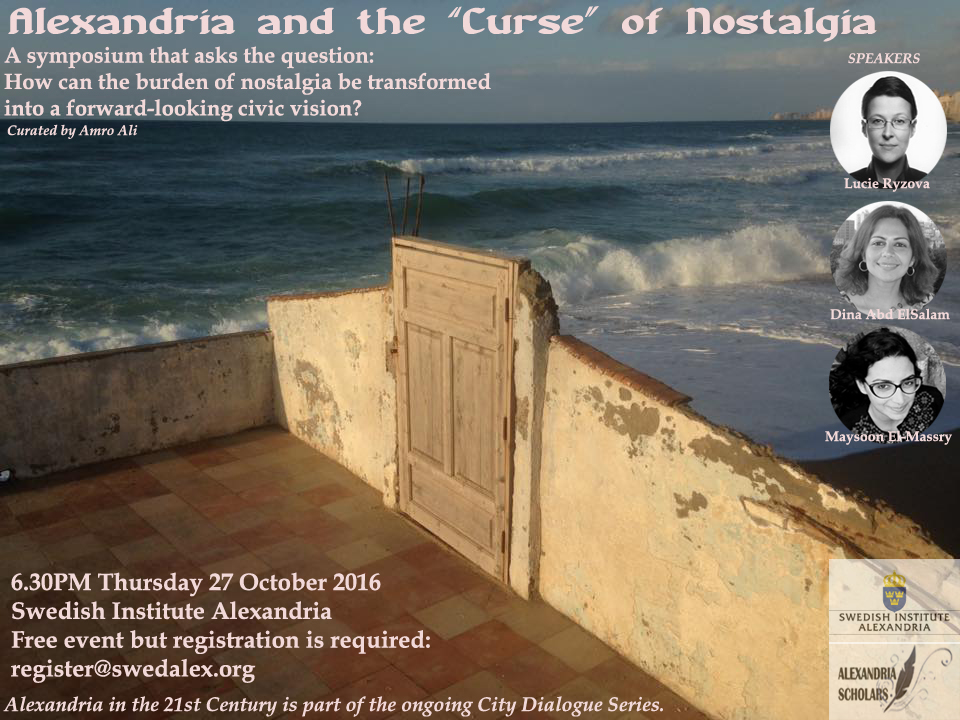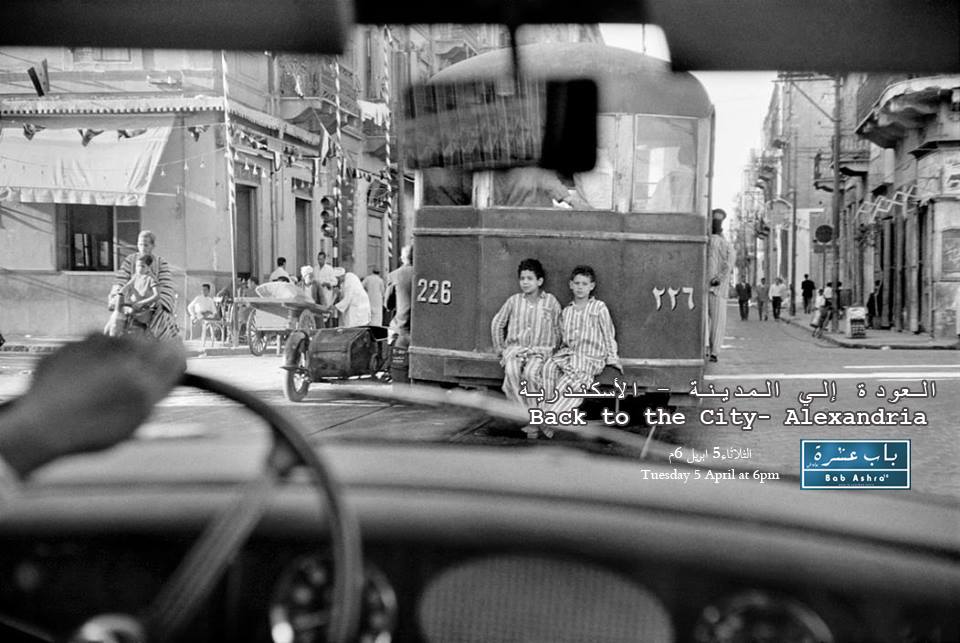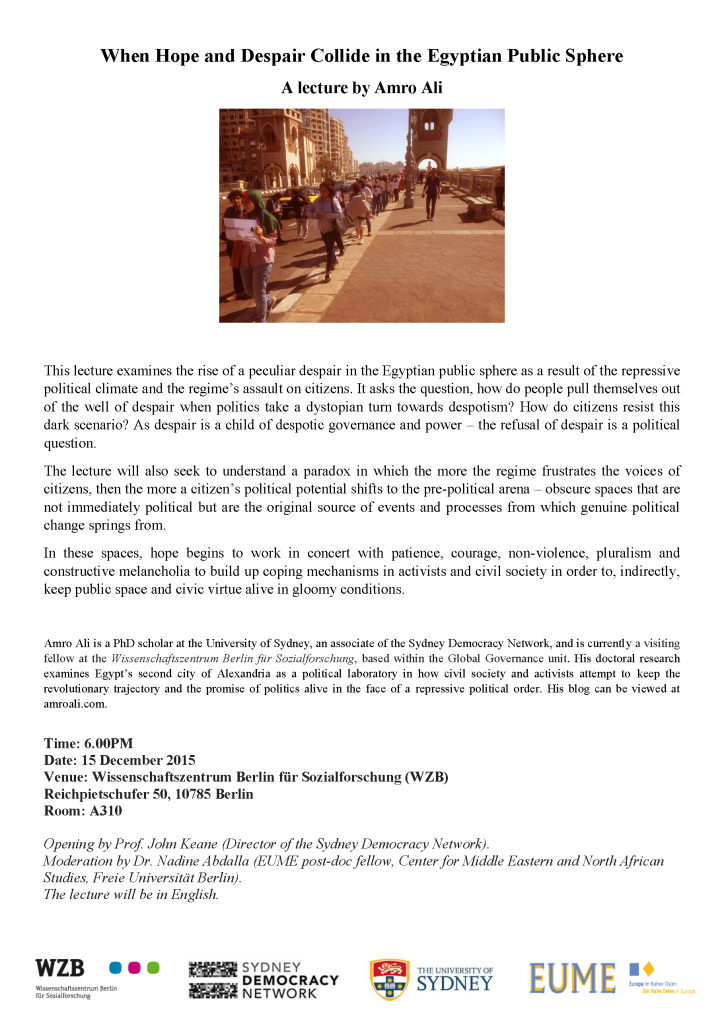Click here for the Facebook event page
Category: Events
Alexandria and the “Curse” of Nostalgia (Second symposium of the City Dialogue Series)
Click here for the Facebook event page
Alexandria and the Search for Meaning (The City Dialogue Series)
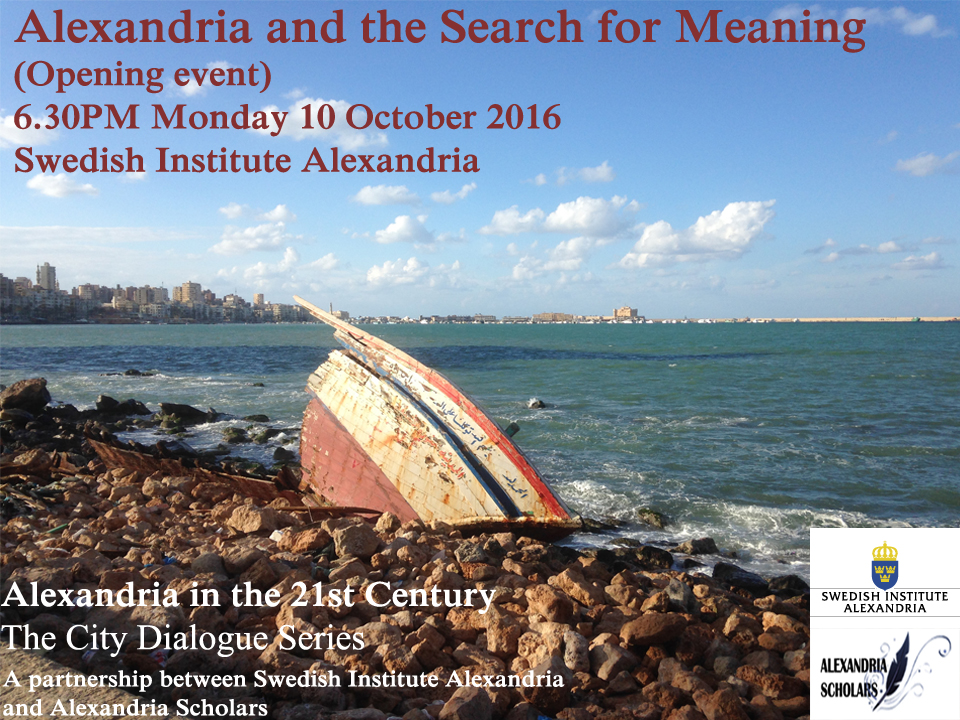
(Click here for flyer link)
The Swedish Institute Alexandria partners with Alexandria Scholars in facilitating an intellectual project that brings together international and national figures to converse with local Alexandrian actors from academia and civil society.
The aim is to discuss and explore prospective solutions to Alexandria’s challenges through the terrain of historical, urban, and philosophical analysis – derived from Alexandria`s pluralist origins. The question we raise is how can the city better understand itself and its positioning in Egypt, Mediterranean basin, and the world given what it used to be as well as its current potential?
The monthly sessions are driven by the view that the public should be recognized, and elevated, as the primary ideal, and Alexandria’s present difficulties in attaining pluralism and civic responsibility is partially tied to the city’s loss of civic meaning and identity as a pivotal and dynamic metropolis on the southern Mediterranean coast.
The first of these monthly sessions will be held at SwedAlex premises on Monday 10h of October at 6:30 pm. It will raise a key question attributed to Alexandria`s contemporary challenges: How can Alexandria reposition itself in the modern world and what are currently the city’s strengths, limitations, and sense of identity?
The four monthly sessions will each, respectively, raise a key question attributed to Alexandria’s contemporary challenges: (a) How can Alexandria reposition itself in the modern world and what are currently the city’s strengths, limitations, and sense of identity? (b) Can the specter of nostalgia that haunts Alexandria be refashioned into a forward-looking civic vision? (c) What ideas and methods can be undertaken to plug the gaps in the dysfunctional education system, and ensure students acquire conceptual thinking and critical skills? (d) What approaches can be implemented in order to endow, or sharpen, Alexandria with a clearer identity and coherent narrative? The sessions will be in English with Arabic translation provided.
Speakers:
Speakers:
Yahia Shawkat – Co-founder & Research Coordinator of 10Tooba).
Reem Eltaib – Manager at Radio Tram and former assistant to governor of Alexandria, Hany el Messiry.
Karim-Yassin Goessinger – Founder and program director of the Cairo Institute of Liberal Arts and Sciences.
Curated by Amro Ali (lecturer in sociology at the American University in Cairo, and founder of Alexandria Scholars).
Please register your attendance by sending an email to
* This lecture is in English language.
* Limited seats available. Priority for early registration.
Facebook event: https://www.facebook.com/events/955615517882221/
Next Events:
Session two: Alexandria and the “Curse” of Nostalgia (13 October 2016).
Session three: Alexandria and Miseducation System (10 November 2016).
Session four: Alexandria and the Reconstruction of a Civic Ethos (8 December 2016).
The Middle East: World Crisis? A Conference
I will be giving a talk on 4 June in Berlin regarding Egypt’s role in the region vis-à-vis Saudi Arabia and Turkey, with a focus on how the 2011
revolution impacts the legitimacy and narrative surrounding Egypt’s foreign policy decisions.
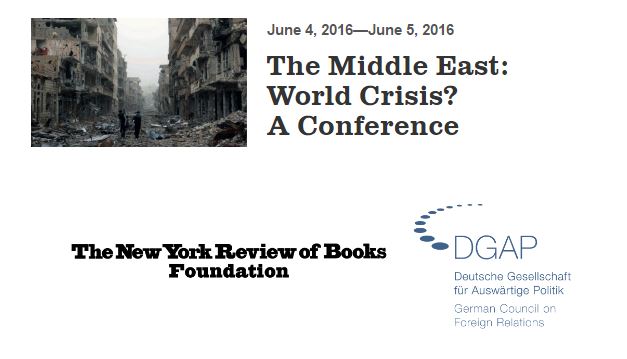
“The Middle East is now subject to a conjoncture of political instability, economic dysfunction, growing religious extremism and seemingly endless war which is bringing misery and hardship to tens of millions of its citizens, and with a capacity to increase already shocking levels of violence in a zone stretching from the Afghan-Pakistan border to the southern shores of the Mediterranean.
In the late summer of 2015 the crisis took on a new and frightening dimension. A year of escalating violence in Syria and Iraq, driven by the Islamic fanaticism of ISIS, has unleashed a huge wave of refugees fleeing for their lives and seeking sanctuary mostly in the member states of the European Union.
With the added violence of the terrorist attacks in Paris and now Brussels, this has become for Europe perhaps the gravest crisis of its kind since the Second World War and engages the continent in the day to day affairs of the Middle East in ways that are unprecedented. Our conference, taking place at the heart of the EU in Berlin, will we hope contribute towards an understanding of the region’s multiple crises, and explore paths to their solution.”
Organised by the New York Review of Books Foundation and the German Council on Foreign Relations (DGAP.
Panel III: Turkey, Egypt, and Saudi Arabia: Regional Powers Manque?
Time: 2:30 PM 3 June 2016
Chair: Sarah Hartmann, DGAP
Amro Ali, University of Sydney
Professor Bülent Aras, Sabancı University, Istanbul
Professor Madawi Al-Rasheed, The London School of Economics
Venue: Deutsche Gesellschaft für Auswärtige Politik
Rauchstraße 17,
Berlin, Germany
Back to the City: Understanding Alexandria’s Historical Awareness of Civic Responsibility
I will be giving a talk and holding a discussion that seeks to understand how historical and philosophical processes shape the Alexandrian citizen’s relationship to identity, spaces and history. The session will raise questions of how does one improve their relationship to the city in a climate of indifference and apathy? How is greater meaning attained, beyond food and work, when mediocrity is on the rise? How does one set a counter-example when things around – from architecture to basic aesthetics – appear to be getting worse and ugly. The talk is to initiate a conversation on what challenges prevent such questions being raised and enacted, and what dimensions of Alexandrian society hampers social and civic progress.
This talk will be in Arabic
Date: 5 April 2016
Time: 6pm
Venue: Bab Ashra, Alexandria
Facebook event page
Free admission and open to the public. As seating is limited, please register by sending a message with your name and mobile phone number to Bab Ashra Facebook Page
more info :
03/5754917 – 01220841384 – 01223541065 – 01211624006
www.facebook.com/bab.ashra
Address : Janaklis ,abuoker .. mortada st. Elkhalig tower entrance G ..first floor
العودة إلى المدينة
عن فهم تاريخ الوعي بالمسئولية المدنية في الإسكندرية في إطار تاريخي
هذه المناقشة تسعى إلى فهم كيف شكلت العوامل التاريخية والفلسفية علاقة المواطن السكندري بالهوية والمساحات والتاريخ . كما انها تثير عدة أسئلة منها: كيف يمكن للمرء تحسين العلاقة بينه وبين المدينة في جو من اللامبالاة و الفتور ؟ كيف يمكن التوصل الى معان أسمى للحياة تتخطى الأكل والعمل في حين أن الاعتيادية في ازدياد ؟ كيف يصبح الانسان نموذجا للمقاومة عندما تكون الأمور في جميع النواح – من العمارة إلى الجماليات الأساسية – تزداد سوءا و قبحا .
المناقشة تأتي لبدء حديث عن التحديات التي تحول دون اثارة مثل هذه الأسئلة، كما انها تضم الأبعاد المختلفة في المجتمع السكندري التي تعوق التقدم الاجتماعي و المدني .
نأسف لمحدودية العدد نظراً لسعة المكان , لراغبي الحضور ارسال الأسم ورقم الموبايل علي :
https://www.facebook.com/
لمعلومات أكثر:
03/5754917 – 01220841384 – 01223541065 – 01211624006
www.facebook.com/bab.ashra
أو التوجه مباشرة الي مقر الأتيليه :
637 جناكليس شارع أبو قير ,شارع مرتضي , برج الخليج مدخل “ج” الدور الأرضي .
When Hope and Despair collide in the Egyptian public sphere (lecture in Berlin)
The fallacy of claiming the Islamic State is a bigger threat to world order than Cold War communism. (Debate)
The Sydney University Politics Society
have organised a debate titled:
The Islamic State is a bigger thr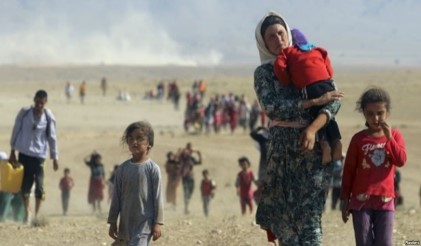 eat to world order than Cold War communism.
eat to world order than Cold War communism.
Although I disagree with the premise of the debate, I agreed to take part in it. I will be in the negative and therefore my position will be, basically, that ISIS is a dangerous security threat, but they are no Soviet Union. The talk will be more nuanced than that :).
Time: 5pm
Date: 2 June 2015
Venue: The Refectory, Quadrangle, University of Sydney
The Strategic Implications of ISIS (Lecture)
My talk will examine the strategic threat of ISIS on Syria,
Saudi-Iran relations, West-Iran relations, Arab uprisings,
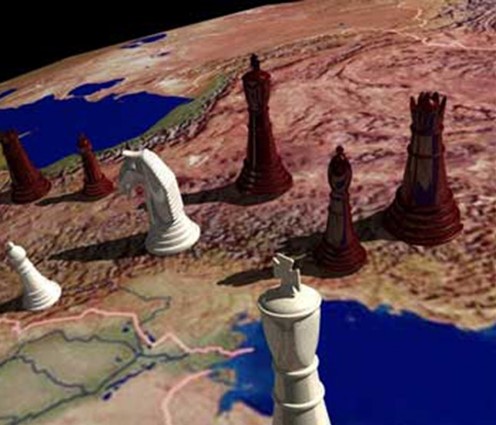 Iraqi Kurdistan and the dangerous precedent set by having a new ideology injected into the world of affairs. It will also look at how the regional discourse is being reshaped to roll back the appeal and narrative of ISIS.
Iraqi Kurdistan and the dangerous precedent set by having a new ideology injected into the world of affairs. It will also look at how the regional discourse is being reshaped to roll back the appeal and narrative of ISIS.
Time: 5pm
Date: 21 May 2015
Venue: Simmonds Lecture Theatre, G01, General Purpose Building, University of Western Australia.
See Facebook event for updates.
Organised by the UWA International Relations Society.
(Symposium) Cultures Of Freedom And Contending Visions Of Governance: Voices From The Arab And Muslim Worlds
Click here for Conference program (PDF)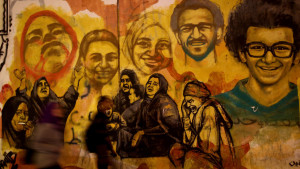
(via Lucia Sorbera)
Click here for the Event page.
Click here for the Key speakers Facebook page.
(with links for free registration)
Despotism and the unmaking of the Egyptian Citizen (conference paper)
I will be giving a presentation this Friday titled “Despotism and the Unmaking of the Egyptian Citizen” at the New Law School, seminar room 342. University of Sydney. At 1.15pm – 2.45pm.
This is part of a panel that includes Lucia Sorbera (presenting Gender, Politics,and Political Legitimacy in Egypt), Sara Verdi (On Memorialisation, AUC) and Walid El Khachab (Popular culture and Reclaiming the public space: Resistance in the aftermath of the Arab Spring, York University). Chaired by May Telmissany (University of Ottowa).
The conference starts this Thursday at 9.15am, and ends on Friday evening. Details on the conference can be viewed here: http://whatson.sydney.edu.au/events/published/symposium-cultures-of-freedom-and-contending-visions-of-governance-voices-from-the-arab-and-muslim-worlds
Conference program (PDF): Conference Program – April 9-10 2015


